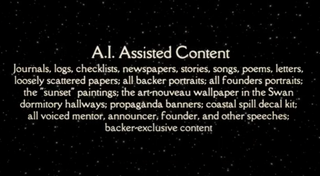Myst creator defends its use of 'AI assisted content' in latest game (updated)
Cyan Worlds says that AI was only used to modify audio and to "ideate and experiment."

Update (June 9): Firmament developer Cyan Worlds issued a longer statement on Twitter, reiterating that the game's voice performances were not AI generated—they were done by a staff member who chose not to be credited—and adding that AI writing tools were used to "ideate and experiment" rather than to generate text wholesale, and that AI art tools were also used to "ideate" and only on "texture assets for very specific scenarios."
"Cyan has a talented team of individuals (all human beings) with a breadth of skills and experience who have been working on this game for over four years, from scratch," wrote the studio. "We are disappointed to see their contributions minimized and overshadowed by egregious speculation about our usage of AI tools. Although individuals on the team did leverage AI tools to help with the development of the contents listed above, absolutely nothing in this small fraction of content for the game was generated and used outright from these services without extensive human oversight and revision."
For a larger version of this statement please visit: https://t.co/bj2QR9k0tu pic.twitter.com/opRRqzPKgVJune 8, 2023
A couple of backers have taken to Firmament's Kickstarter comments to defend the studio: "The level of hate here towards something so trivial as using tools, created by humans, for humans to make their jobs easier is astonishing," said a backer.
Others remain dissatisfied. "As a Kickstarter backer, I feel like you guys lied to me by not disclosing your plan to use AI in the first place," reads one response to the statement on Twitter. Our original story on the reaction to Cyan's use of AI in Firmament follows below.
Original story (June 7): In the credits for Firmament, the latest puzzle game from Myst developer Cyan Worlds, a briefly-seen paragraph of text reveals that many aspects of the game, including written lore and voice acting, were created with the help of AI. Some noticed the "AI assisted content" message just after Firmament released in May, while others (like me, via Kotaku) are just now learning about it. For some players, it explains a lot.
The complete list of stuff generative AI was involved in is, deep breath: "Journals, logs, checklists, newspapers, stories, songs, poems, letters, loosely scattered papers; all backer portraits; all founders portraits; the "sunset" paintings; the art-nouveau wallpaper in the Swan dormitory hallways; propaganda banners; coastal spill decal kit; all voiced mentor, announcer, founder, and other speeches; backer-exclusive content."
Cyan Worlds told Kotaku that these aspects of Firmament were "assisted, not wholly created" by AI tools used by Cyan staff. As an example, the developer said that "all voice acting content was performed by an actual human being 100% of the time," but that the "timbre, pitch, and tone" were modified with an AI tool with the consent of the performer (who strangely isn't credited). The voice acting was something we praised in our review.
The biggest gaming news, reviews and hardware deals
Keep up to date with the most important stories and the best deals, as picked by the PC Gamer team.
Cyan did not go on to explain how elements like journals were "assisted" by AI. My interpretation would be that a large language model like ChatGPT was used to generate rough copy, which was then modified by human writers (which I'd personally call "human assisted" writing), but it's possible that AI was used in another way. It also isn't clear how the artworks mentioned were made: Whether they were generated by services like OpenAI's Dall-E and then edited by a human artist, or whether an artist conceived of and produced the artworks with AI tools taking a more subordinate role.
Firmament was funded on Kickstarter, where backers pledged over $1.4M in 2019 to see the game made. A number of backers have now returned to the Kickstarter comments to express their discontent over Cyan's use of AI. The recurring feelings being expressed are that using AI for creative work is unethical and resulted in an inferior game, and that Cyan should have told them up front it was using such a controversial new technology in the game they funded rather than sticking a disclaimer in the credits.
"I don't want my money going towards projects making extensive use of AI-generated content, especially when the art and writing made by HUMANS is the reason I keep coming back to these games," wrote backer Ryusui. "Way to alienate a longtime fan, Cyan!"
"If I wanted an AI to create a game, why am I paying a company to do that for me instead of doing it myself?" wrote E Color. "I am afraid that I will no longer back or purchase any future Cyan projects."

Our review offers a positive, but not glowing, perspective on Firmament, and the game has around 500 positive Steam user reviews. Other players have been less than satisfied with the adventure-puzzler, however. Bugginess and tedious or too-simple puzzles are two recurring complaints, and players have also said that the picturesque environments feel lifeless, and the narrative dull, which some now attribute to the use of AI.
"The realms feel so shallow with only a few pieces of writing per realm (maybe like 10 things to read the entire game total)," wrote a Steam reviewer in May. "Then to rub salt in the wound they used AI to assist with this game, including journals and newspapers. For such a successful Kickstarter and a game that already has next to no text, it's a complete shame that they used AI to write half-baked journal entries."
"I wouldn't have given money if I'd known AI was going to be used, though in retrospect it certainly goes to explain why for how beautiful the worlds looked they felt as equally devoid of life," said Kickstarter backer Io Otter more recently.
This is just the tip of the iceberg for questions and criticisms around "AI assisted" game development, and "AI assisted" everything. Generative AI is being used in game development for everything from creating artwork to recapping staff meetings, and is already being integrated into major applications, such as Photoshop. In a GDC talk I went to, a game developer explained numerous everyday ways he's integrated generative AI tools into his work, including debugging code and writing social media posts. We recently had a discussion with Hardspace Shipbreaker studio Blackbird Interactive about this topic exactly, which you can listen to here.
I've asked Cyan Worlds if it can elaborate on how it used AI in the development of Firmament, and if it has a response for Kickstarter backers who feel they were misled through omission.

Tyler grew up in Silicon Valley during the '80s and '90s, playing games like Zork and Arkanoid on early PCs. He was later captivated by Myst, SimCity, Civilization, Command & Conquer, all the shooters they call "boomer shooters" now, and PS1 classic Bushido Blade (that's right: he had Bleem!). Tyler joined PC Gamer in 2011, and today he's focused on the site's news coverage. His hobbies include amateur boxing and adding to his 1,200-plus hours in Rocket League.
Most Popular






